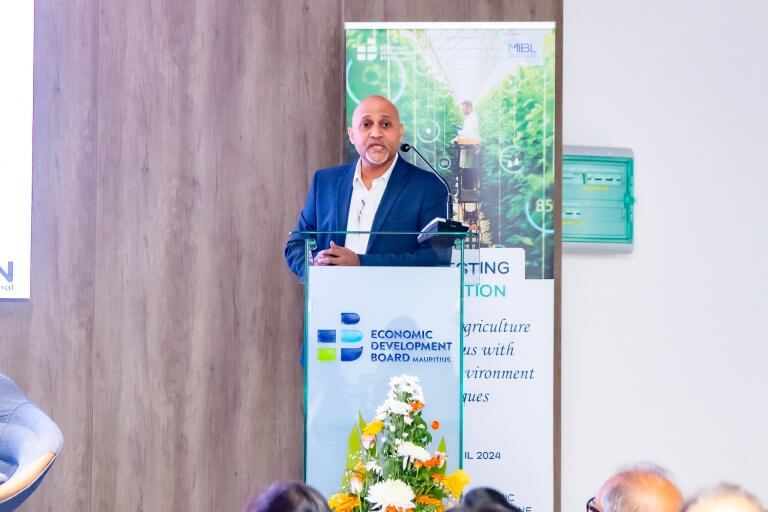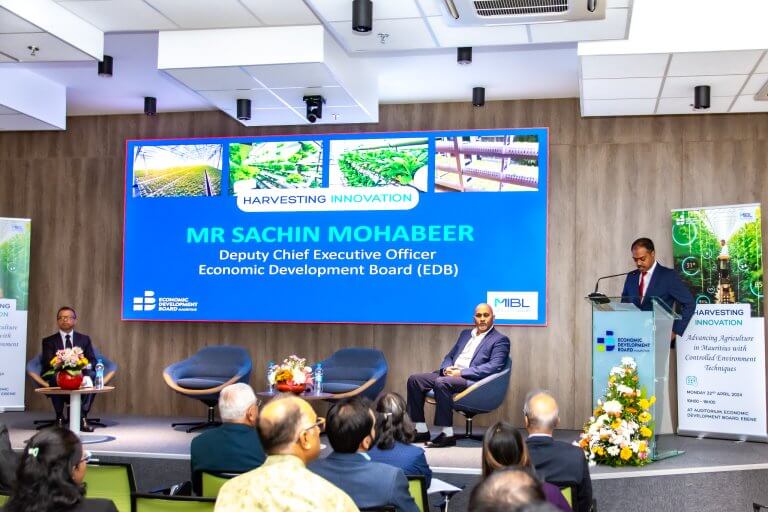The Workshop About Smart Agriculture
To tackle the ongoing food security challenges in Mauritius, the Economic Development Board (EDB) and the Mauritius Institute of Biotechnology Ltd (MIBL) joined forces to host a workshop centered on Controlled Environment Agriculture (CEA) on Tuesday, April 23rd, 2024. The event gathered 60 diverse participants, including representatives from the private sector, farmers, students, and key officials, to promote discussion and innovation within the agricultural industry (Smart Agriculture).

Goal of the Workshop
Despite a decrease in agriculture’s contribution to the GDP in recent years, it remains a crucial sector, accounting for 4.1% of the GDP. However, the country’s heavy reliance on food imports, coupled with challenges like climate change, global crises such as COVID-19, and geopolitical tensions, underline the importance of adaptive and resilient agricultural practices. This workshop was a proactive step towards addressing these urgent issues by exploring different methods of food production and encouraging cooperation among various stakeholders.
Smart Agriculture Practices
Dr. Mandar Godge, a seasoned expert from Global Resources and Agricultural Innovations Network International (GRAIN), a leading Ag-Biotech company with over twenty years of experience in CEA, led the discussions. Through engaging presentations, Dr. Godge shared valuable insights and practical knowledge, shedding light on innovative agricultural practices to tackle Mauritius’ challenges while considering the specific intricacies of CEA. Participants had the opportunity to learn about innovative techniques for growing crops in controlled environments, such as indoor farming, aquaponics, and vertical farming.
Controlled Environment Agriculture
The workshop also included two insightful panel discussions focusing on vital aspects of Controlled Environment Agriculture (CEA) implementation: financial structures and incentives, and the creation of a supportive environment. The panel discussions highlighted information on funding opportunities and investment mechanisms to support CEA initiatives, the importance of establishing a conducive environment for adopting CEA practices, and the infrastructural support needed to integrate CEA technologies nationwide, such as education, skills development, and fostering the entrepreneurial ecosystem. Collaboration among government entities, research institutions, and industry stakeholders was emphasized to streamline processes and eliminate barriers for aspiring CEA entrepreneurs.

Importance of Smart Agriculture
During his presentation, Dr. Mandar Godge emphasized the importance of utilizing technology and sustainable practices to enhance Mauritius’ food security and reduce import dependence. This transformative process requires concerted efforts across the agricultural value chain, emphasizing collaboration and knowledge-sharing among stakeholders. Mr. Sachin Mohabeer, Deputy CEO of EDB, echoed this sentiment by stating that prioritizing environmental stewardship, social responsibility, and economic viability in agriculture is crucial for establishing a sustainable and restorative system that benefits both humans and the planet. Providing the necessary ecosystem for success, including incentives, financial access, training programs, research facilities, and suitable land for agriculture, is essential to revolutionizing agriculture in Mauritius.
Promote Agriculture as a Career
Moreover, the Deputy CEO highlighted the significance of promoting agriculture as a viable career choice and showcasing modern technologies and innovative practices to attract technologically savvy individuals to contribute to the sector’s transformation in Mauritius.


